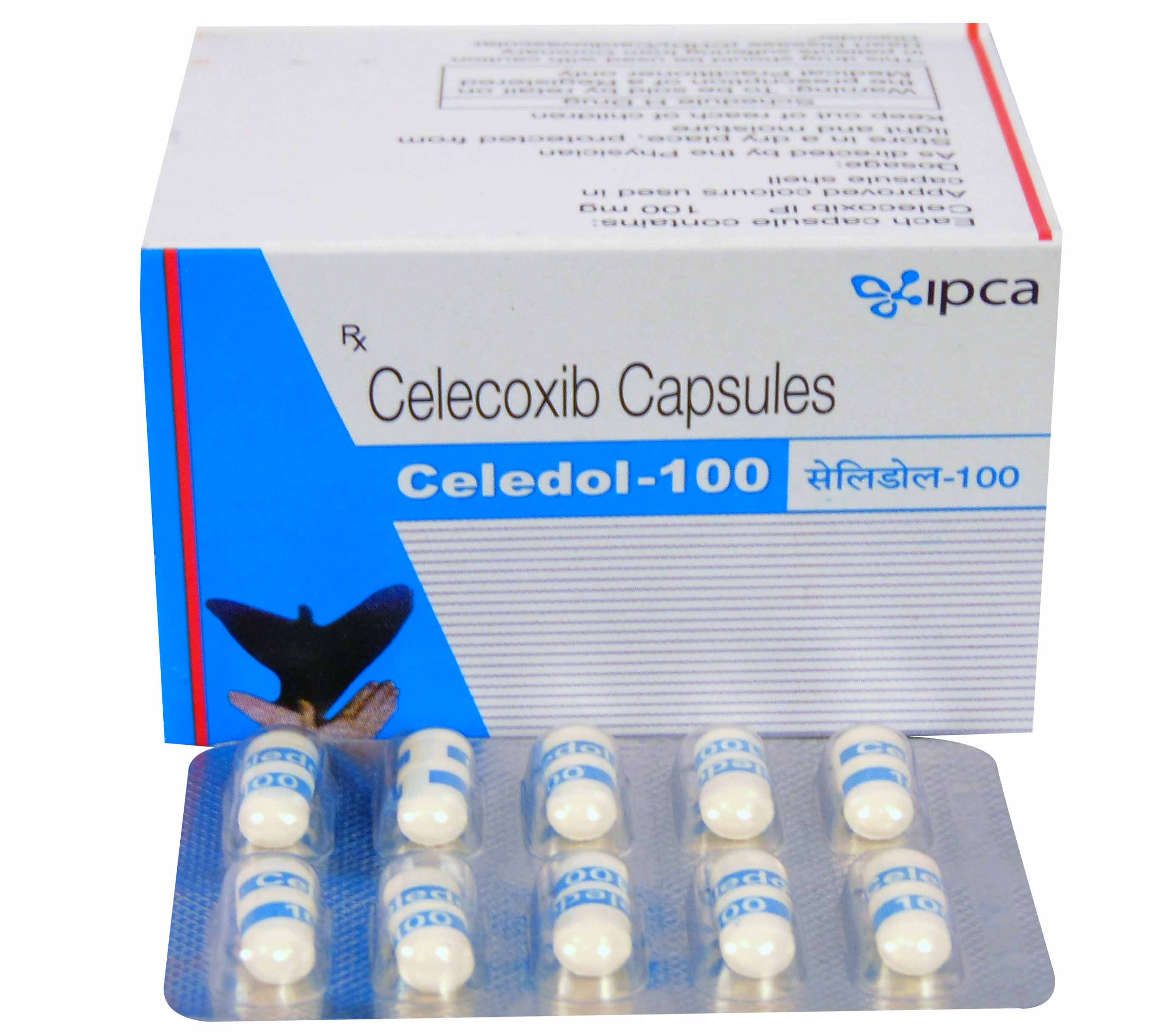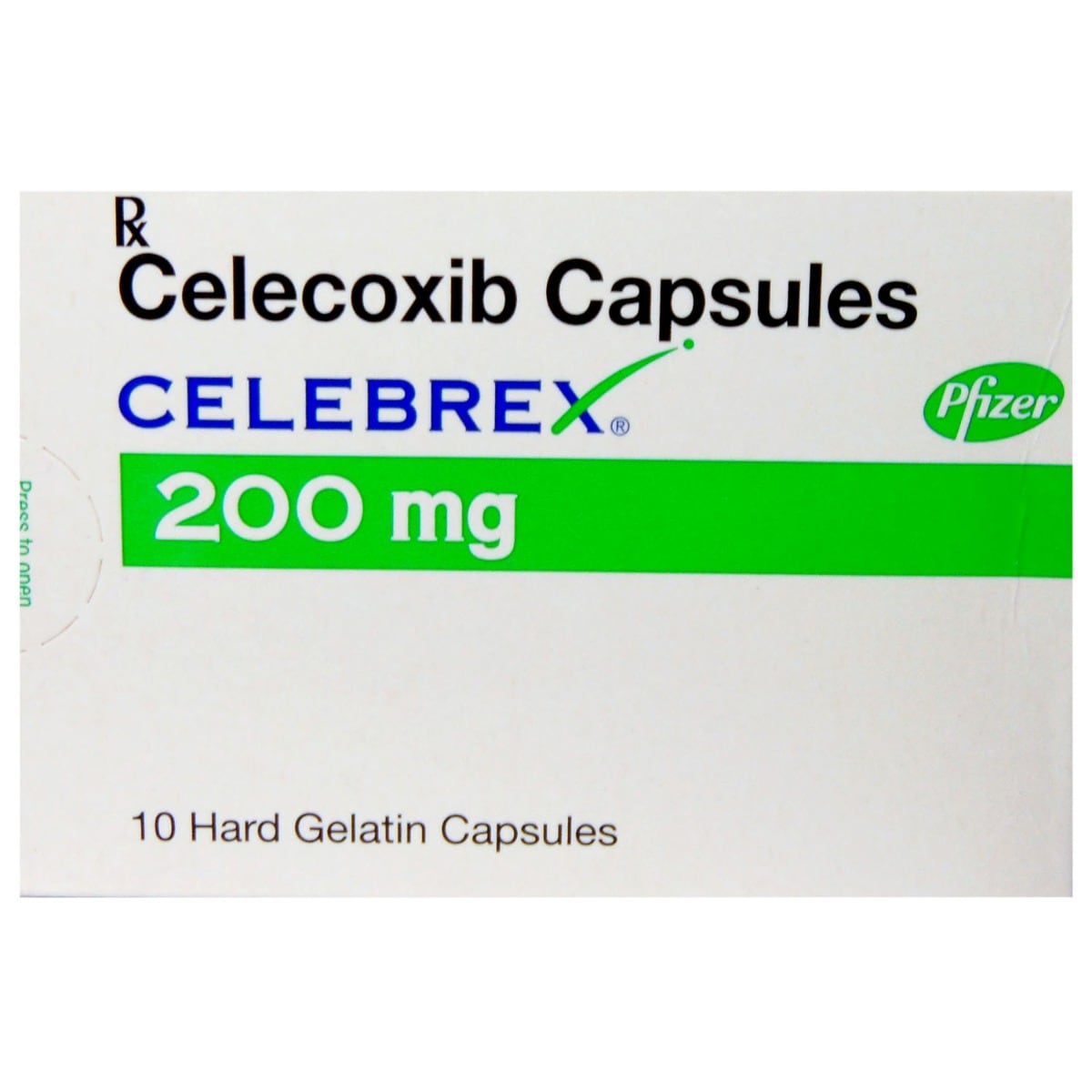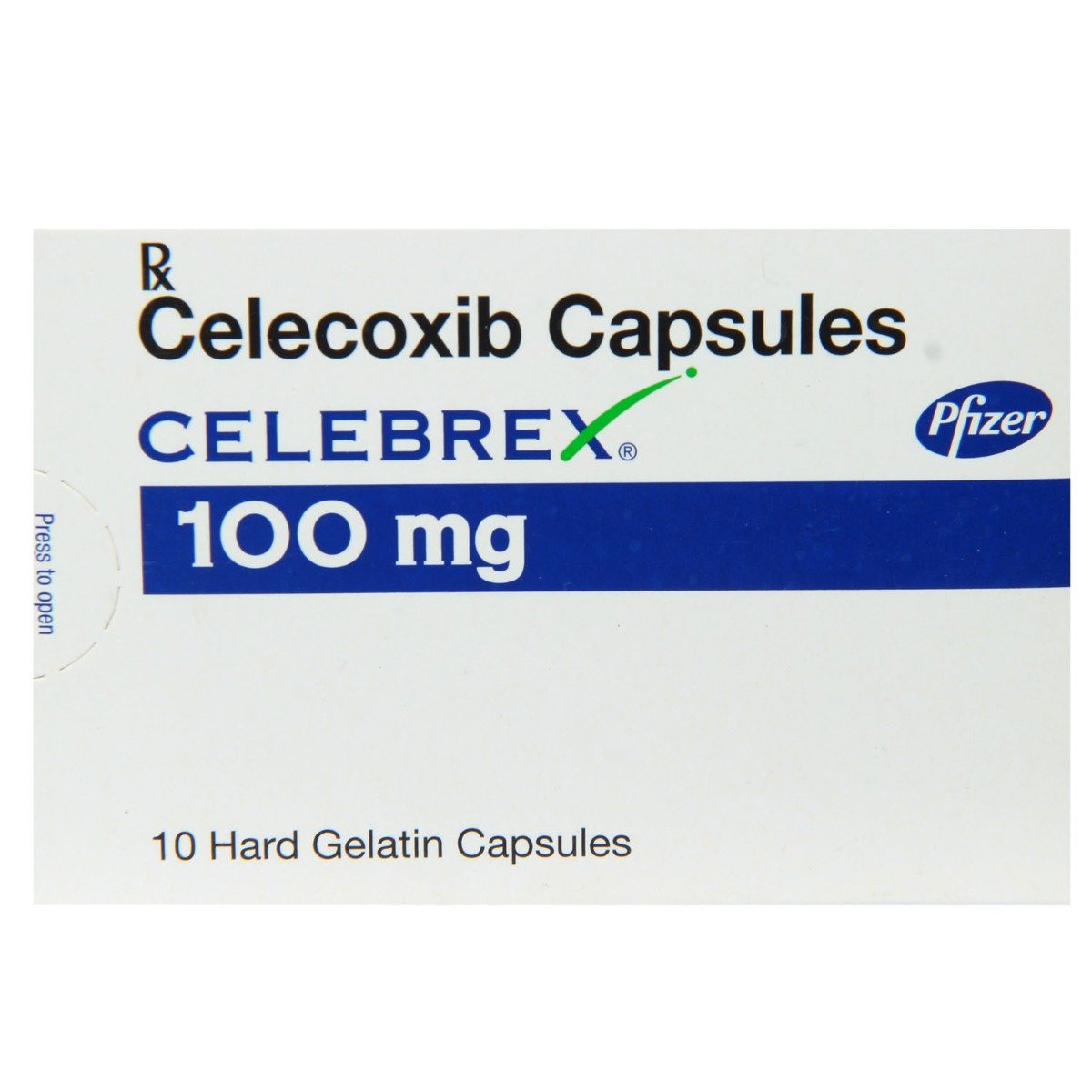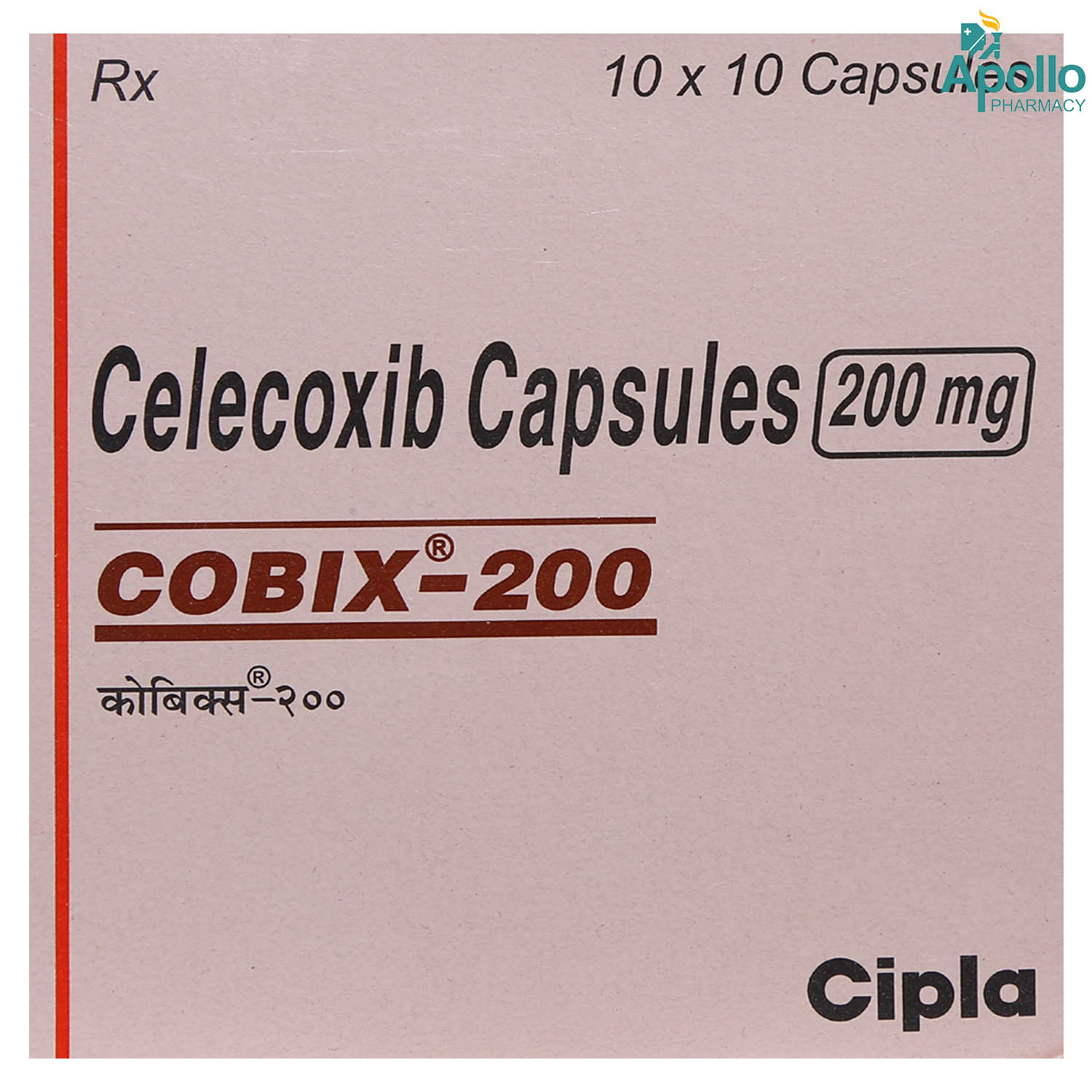Celecoxib
About Celecoxib
Celecoxib contains 'pain killers,' primarily used to reduce pain and swelling in muscles and joints. It treats painful conditions of osteoarthritis, rheumatoid arthritis, ankylosing spondylitis (pain and stiffness in the backbone), cervical spondylitis (wear and tear of spinal discs in neck), and menstrual pain. Arthritis is a condition that causes swelling of one or more joints resulting in pain and stiffness of joints that worsen over time.
Celecoxib contains Celecoxib, which works by blocking cyclo-oxygenase (COX) enzyme, responsible for causing pain and inflammation in the body. Thereby, it helps relieve pain and swelling associated with different types of arthritis, spondylitis, low back pain, and menstrual pain.
Your doctor will advise you on how often you take this medicine based on your medical condition. In some cases, you may experience indigestion, stomach pain, diarrhoea, oedema, and flatulence. Most of these side effects of Celecoxib do not require medical attention and gradually resolve over time. However, if the side effects persist or worsen, please consult your doctor.
If you are known to be allergic to Celecoxib or any other medicines, please tell your doctor. If you are pregnant or breastfeeding, please inform your doctor before taking Celecoxib. Do not consume alcohol with Celecoxib as it may increase the risk of stomach bleeding. Celecoxib may cause an increased risk of severe heart problems like myocardial infarction and stroke, which can be fatal. It should not be used by a patient who has undergone recent heart bypass surgery or will have it. Celecoxib increases the risk of severe gastrointestinal conditions like bleeding, ulceration, and perforation of the stomach or intestines, which can be fatal.
Uses of Celecoxib
Medicinal Benefits
Celecoxib contains 'pain killers' primarily used to reduce pain and swelling in muscles and joints in conditions such as osteoarthritis, rheumatoid arthritis, ankylosing spondylitis (pain and stiffness in the backbone), cervical spondylitis (wear and tear of spinal discs in neck), menstrual pain. It contains Celecoxib, which works by blocking the action of cyclo-oxygenase (COX) enzyme in the body involved in producing certain chemical substances such as prostaglandins that cause pain and swelling. Thereby, it helps in relieving pain and swelling associated with different types of arthritis.
Directions for Use
Storage
Side Effects of Celecoxib
- Indigestion
- Stomach pain
- Diarrhea
- Edema
- Flatulence
- Constipation
- Headache
Drug Warnings
Do not take Celecoxib if you are allergic to any of its ingredients. Celecoxib may cause an increased risk of severe heart problems like myocardial infarction and stroke, which can be fatal. It should not be used by the patient who has had undergone recent heart bypass surgery or will have it. Celecoxib increases the risk of severe gastrointestinal conditions like bleeding, ulceration and perforation of the stomach or intestines, which can be fatal. Elderly patients are at greater risk for gastrointestinal bleeding problems so that the doctor can limit their dose. Celecoxib is not recommended for pregnant women, especially in the third trimester as it may cause harm the unborn baby (fetus). Therefore, pregnant or breastfeeding women are advised to consult a doctor before taking Celecoxib. Do not consume alcohol with Celecoxib as it may increase the risk of stomach bleeding or ulcer. If you experience weight loss, diarrhoea, pain or vomiting, please stop taking Celecoxib and consult a doctor immediately. These might be signs of worsening or Crohn’s disease or ulcerative colitis (swelling in the digestive tract).
Drug Interactions
Drug-Drug Interaction: Celecoxib may have interaction with pain killers (ibuprofen, diclofenac, paracetamol, aspirin), high blood pressure-lowering medicines (propranolol, enalapril, losartan, candesartan), water pills (furosemide), blood thinners (heparin, warfarin, clopidogrel), fits related medicines (phenytoin), antidiabetic drugs (glimepiride, glipizide), antibiotics (moxifloxacin, ciprofloxacin), HIV/AIDS medicines (Zidovudine), Immuno-suppressants medicines (cyclosporine), cardiac drugs (digoxin), psychiatric medication (lithium).
Drug-Food Interaction: Celecoxib may interact with alcohol. Therefore, avoid alcohol intake while taking Celecoxib as it may increase the risk of stomach bleeding.
Drug-Disease Interaction: People with diabetes, stomach ulcer, gastrointestinal bleeding, asthma, kidney, liver or heart problems and an autoimmune condition, such as systemic lupus erythematosus (joint pain, fever and skin rashes), colitis or Crohn’s disease (conditions causing swelling of the bowel, diarrhoea, bowel pain, vomiting and weight loss) should consult a doctor before taking Celecoxib.
Drug-Drug Interactions Checker List:
Safety Advice

Alcohol
unsafeTaking alcohol, along with Celecoxib, can increase the chances of gastrointestinal bleeding and kidney damage.

Pregnancy
unsafeCelecoxib is a category C pregnancy drug. It should not be given during pregnancy, especially during the last trimester, as it is known to cause fetal deformities.

Breast Feeding
cautionCelecoxib is not recommended for breastfeeding women.

Driving
cautionCelecoxib is not known to cause drowsiness, but if you feel sleepy, please do not operate or drive any machinery.

Liver
cautionIf you have had a history of any liver-related diseases, please consult the doctor before taking medicine.

Kidney
cautionIf you have had a history of any kidney-related diseases, please consult the doctor before taking medicine.

Children
cautionCelecoxib is not recommended for children below the age of 2 years. For children aged above 2 years, take it in dose and duration as prescribed by your doctor.
Habit Forming
Diet & Lifestyle Advise
- Include more glucosamine, chondroitin sulfate, vitamin D, calcium-enriched supplements. Besides this, turmeric and fish oils can help in reducing inflammation in the tissue.
- Do not go for heavy exercise as it may increase your joint pain in arthritis. Instead, you can do stretching, low impact aerobic exercise like walking on a treadmill, bike riding and swimming. You can also strengthen your muscle strength by lifting light weights.
- In the chronic conditions of arthritis or joint pain, try to include fish like salmon, trout, tuna and sardines. These fishes are enriched with omega-3 fatty acids that minimize the level of a chemical called cytokines, which ramp up inflammation.
- Your sitting posture is important, especially when you have pain and inflammation conditions. Try to sit little as possible, and only for a short time (10-15 min). Use back support like a rolled-up towel at the back of your curve to minimize pain. Keep your knees and hips at a right angle. Besides this, you can use a footrest if required.
Special Advise
- If you are elderly, a smoker, had a stroke previously, or have high blood pressure, diabetes or high cholesterol, please inform your doctor as these conditions may increase the risk of heart problems.
- Regular monitoring of blood pressure as Celecoxib may reduce the blood pressure-lowering effects of certain blood pressure drugs.
- Celecoxib may cause anemia, monitor hemoglobin or hematorcrit in long term treatments.
- Do not take more than the prescribed dose as it may cause Celecoxib overdose and lead to symptoms such as heartburn, stomach upset, unconsciousness, dizziness, ringing or buzzing in ears, fits, fainting, diarrhea or excitation.
Patients Concern
Disease/Condition Glossary
Arthritis: It is a condition that causes swelling of one or more joints resulting in pain and stiffness of joints that worsen over time. There are different types of arthritis, of which osteoarthritis and rheumatoid arthritis are the most common types. The arthritis symptoms include joint pain, stiffness, redness, tenderness, swelling in and around joints and reduced movement of joints. The risk of arthritis increases with age, obesity, previous joint injury or family history. Proper medication, physiotherapy, or sometimes surgery may help reduce arthritis symptoms and enhance the quality of life.
Menstrual cramps: It is a pain a woman feels in the abdomen/stomach due to menstruation (the breakdown of the inner wall of the uterus and the release of blood).
FAQs
Celecoxib contains Celecoxib, which works by blocking the action of pain-inducing chemical messenger cyclo-oxygenase (COX) enzyme in the body involved in producing certain chemical substances such as prostaglandins that cause pain and swelling. Thereby, it helps in relieving pain and swelling associated with different types of arthritis.
Yes, Celecoxib can be used to treat menstrual cramps. Celecoxib is a pain killer that decreases pain and inflammation-inducing chemical messenger known as prostaglandin (PG) production in the body involved in making the uterus (womb) contract during periods.
Arthritis is a chronic condition of joints with pain and inflammation. Celecoxib does not cure arthritis but relieves symptoms of arthritis-like joint pain, swelling and stiffness.
Yes, Celecoxib may increase the risk of heart problems such as heart attack and stroke, especially when used in high doses or for a prolonged duration. It is advised to inform your doctor if you have any of these conditions or have a history of heart problems or stroke before taking Celecoxib. However, it is recommended to take Celecoxib in the dose and for the duration as prescribed by your doctor. It should be not used by the patient who has had recent heart bypass surgery (coronary artery bypass graft - CABG).
No, you are not recommended to take Celecoxib with warfarin as co-administration of these two medicines may increase bleeding risk more easily. However, if you notice blood in urine or stools, dizziness, unusual bleeding or bruising, vomiting, weakness or headache, please consult a doctor immediately. If you are supposed to use these medicines together, you are advised to contact your doctor so that the dose may be adjusted appropriately to use safely.
You should avoid using Celecoxib if you have gastrointestinal ulcer/bleeding, undergone planned heart bypass surgery or pregnant for more than 30 weeks.
Celecoxib may reduce the blood pressure-lowering effects of certain blood pressure drugs, you are advised to contact your doctor so that the dose may be adjusted appropriately to use safely.








